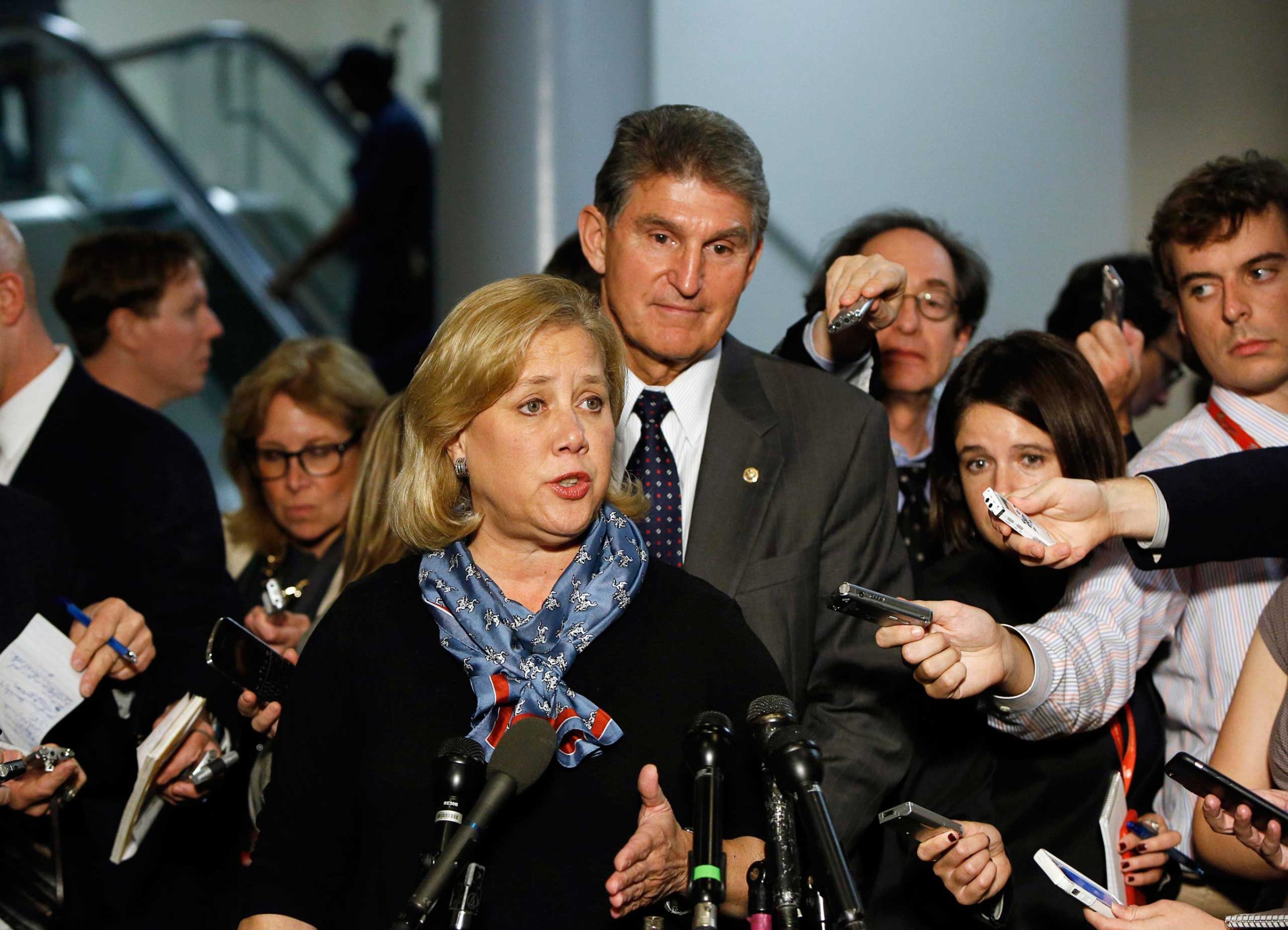
Before the doors to the Senators’ private elevator closed on embattled Louisiana Democrat Mary Landrieu in the basement of the Capitol building Monday afternoon, a reporter shouted to her from the hallway outside: “Who is the 60th?” She replied with a wink.
With just hours to go before a Tuesday night vote to authorize the TransCanada Keystone XL pipeline, Landrieu claims to have the 60 votes she needs for a filibuster-proof majority to ensure passage, but her supporters say they have just 59 votes. If she gets to 60 and the Senate passes the bill, despite opposition from Senate Democratic leaders and the White House, Landrieu hopes it will increase her diminishing chances at re-election in a run-off vote in Louisiana early next month.
“Landrieu is still pulling out every stop, calling, texting, pleading, begging,” says a Senate Democrat aide. “Leadership—they occasionally check in to make sure [my boss is] not flipping, but they’ve been keeping tabs on it…[My boss] had already told Landrieu ‘no’ about 15 times before he got his first Harry Reid call.”
Landrieu’s hunt for a 60th has become a bigger battle between powerful, well-funded environmentalists and energy interests. Passage of the bill would be the strongest signal to President Barack Obama, after six years of debate, that there is now robust political support in favor of building the pipeline.
The Chamber of Commerce has sent around letters supporting the pipeline, even putting the vote on its annual scorecard that helps determine which candidates the powerful business lobby will support in the future. A number of labor groups, including the Laborers’ International Union of North America, North America’s Building Trades Unions and the International Union of Operating Engineers have written letters urging Senators to vote yes.
American Petroleum Institute President Jack Gerard, who “fully expects” the bill to pass, touted its outreach Monday, telling TIME that Senators have heard from “multiple thousands” of constituents burning up the Hill’s phone lines. “I promise you they’ve heard from thousands of their constituents over the past week or two in the post-election cycle,” Gerard says. “These aren’t industry people, these are voters in their respective states.”
The anti-Keystone side has also increased the pressure. On Thursday, League of Conservation Voters President Gene Karpinski hovered just off the Senate floor, giving a hug to Democrat Sen. Chris Coons of Delaware after their conversation, according to a Senate Democrat aide. Coons, a Landrieu target, will likely vote no on the bill.
“Our hope is that it won’t matter,” says David Goldston, the top lobbyist for the anti-Keystone National Resources Defense Council, of the bill, which faces a possible veto from Obama even if it passes. “It will either confirm Congress’ unwillingness to step in on an ongoing process or it will confirm the President’s unwillingness to allow Congress to step in on an ongoing matter.”
Outside groups have even already claimed some credit in influencing the outcome. Jason Kowalski, the policy director of anti-Keystone 350.org, said that his group decided to turn up the heat on Michigan Democrat Sen. Carl Levin after hearing that his front desk was telling callers the Senator was undecided.
“Within 10 minutes we had an email blast out the door to thousands of supporters across Michigan,” says Kowalski. “In a span of two hours his office received over 100 phone calls from Michigan climate activists. Reporters picked up the scent too, and after that two-hour call barrage the Senator told a reporter he would be voting ‘No.’”
Levin said Monday that he’s been “consistently opposed” to Keystone and would vote no Monday. “It would bypass an environmental impact statement on a new route which is a real possibility,” he added.
Landrieu is the driving force behind the fight, calling on years of Senate friendships in hopes of scraping by in the uphill runoff reelection race Dec. 6. The Keystone push is unlikely to be enough—she’s down five points according to Real Clear Politics. But on Monday, Landrieu fought on, conferring on the Senate floor with North Dakota Republican Sen. John Hoeven, West Virgina Democrat Joe Manchin and Virginia Democrat Mark Warner, among other supporters.
Manchin spoke to his fellow West Virginian Democrat Rockefeller while Landrieu spoke for several minutes with Maryland Democrat Barbara Mikulski, who appeared more enthused with what was inside her desk than the conversation. Both Rockefeller and Mikulski are expected to vote “nay” Tuesday. Landrieu says she has 60 votes, although she has yet to name the final one.
“She has a southern charm that is almost irresistible—almost,” joked New Jersey Democratic Sen. Robert Menendez, who said he would oppose the bill Monday.
The White House hasn’t been as aggressive as Landrieu; Maine Independent Sen. Angus King, who says he is likely to vote no, said Monday that Obama’s lobbyists haven’t reached out. But the bill’s supporters say that White House messaging of a likely veto has sidelined some Democrats.
“That frankly makes it tougher to get Democrats on board,” says Ryan Bernstein, chief of staff for Hoeven, a top pro-Keystone Republican.
“Senator Landrieu has a difficult task because it’s a question of will fellow Democrats get to vote their own conscience or are they trying to protect the president,” says the API’s Gerard. “And I think that’s the real challenge.”
More Must-Reads from TIME
- Donald Trump Is TIME's 2024 Person of the Year
- Why We Chose Trump as Person of the Year
- Is Intermittent Fasting Good or Bad for You?
- The 100 Must-Read Books of 2024
- The 20 Best Christmas TV Episodes
- Column: If Optimism Feels Ridiculous Now, Try Hope
- The Future of Climate Action Is Trade Policy
- Merle Bombardieri Is Helping People Make the Baby Decision
Contact us at letters@time.com